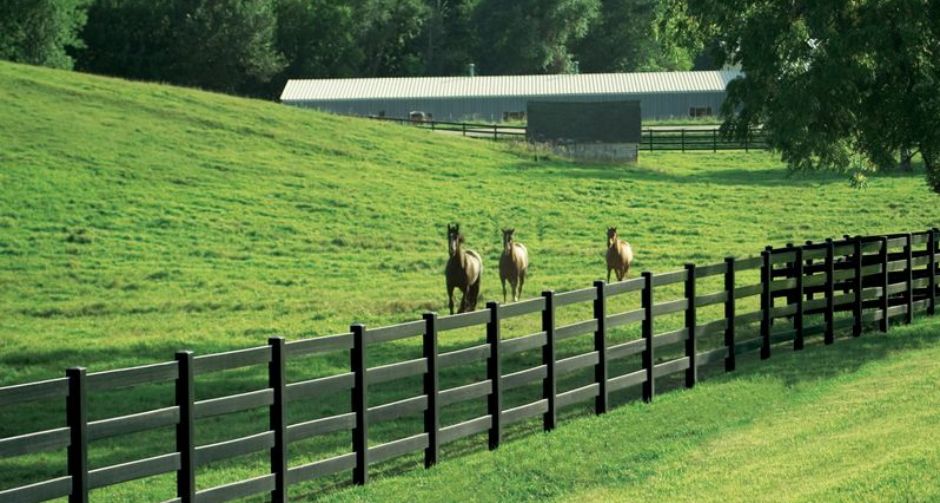What type of fences are best for a farm?
Christina Guerrero
on
June 24, 2023



Get Your Free Fence Quote Today!
Are you looking to create a secure and reliable fencing system on your farm? A fence is an important way to keep pets, equipment, livestock, and other animals separated from each other. Not only does it provide safety for the animals but also helps protect their feed areas too. There are many different kinds of fences available which can make choosing the right one for your property a daunting task. To help make this decision easier, we have outlined some of the main options—as well as tips about deciding which type is best suited for you and your farm’s specific needs—so that you can find the perfect match!
Different types of fences used on farms
When it comes to deciding what type of fence is best for a farm, there are many factors to consider. The most common types of fences for farms include rail fences, barbed wire fences, woven wire fences, cable wire and mesh wire fences and electric fences.
Wood Fencing – Rail fences on farms
Wood fencing is a versatile and practical choice for many reasons. Not only does it offer privacy and security for animals and crops, it also has a rustic aesthetic that blends nicely into rural landscapes. However, like any outdoor investment, regular maintenance is key to ensure longevity. I recommend inspecting your wooden fence annually for rot, warping, or damage caused by weather or animals.
Wood rail fencing is a popular choice for farms due to its versatility. It is a great way to provide privacy and security for both animals and crops, as well as adding a touch of beauty to the scenery. This type of fencing consists of wooden posts, typically 4-5 feet apart, connected by horizontal rails that are typically 2-3 feet long. This type of fencing is an economical option and requires minimal maintenance over its lifetime.
Pros and Cons of Barbed Wire Fencing
As a farmer, deciding on the best fence to use for your land can be a bit of a daunting task. Barbed wire fencing is a popular choice among farmers for various reasons. For one, it’s relatively easy and quick to install, and it’s also highly cost-effective. Additionally, the sharp barbs can help keep predators out and livestock in. However, there are also some cons to consider.
One of the biggest drawbacks of barbed wire fencing is its potential to cause serious injury to both humans and animals alike. The wire can be dangerous if not handled with care, and if a cow or horse gets tangled up in it, it can result in severe cuts and even death. Ultimately, when it comes to barbed wire fencing, it’s important to weigh the pros and cons thoroughly before making a decision.
How electric fencing can be used on farms
As a farmer, you want to keep your livestock safe and secure, but traditional fencing can be expensive and time-consuming to install. This is where electric fencing comes in as a cost-effective and efficient solution. By running electric pulses through the wires, electric fencing creates a psychological barrier for your animals, effectively keeping them in and predators out.
It can be powered by batteries or a main source of electricity, depending on your needs, and is relatively easy to install with the right equipment and know-how. Overall, electric fencing is a practical option that provides peace of mind for farmers looking to protect their livestock and property.
Other wire fencing for farms
Wire fencing is another popular choice for farmers. Woven wire fencing, cable wire fencing, and mesh wire fencing are all commonly used on farms.
Woven wire fencing is one of the most cost-effective and widely used types of fencing on farms. It typically consists of galvanized steel wires that are woven together in a diamond-like pattern, offering strength and durability. It can also be used to build temporary fences around fields or as a permanent boundary between properties.
Cable wire fencing is another wire fence option for farmers. This type of fence is constructed with high-tensile steel wires that are twisted together to create a sturdy barrier for livestock and other animals. It’s also highly durable and can withstand extreme weather conditions.
Mesh wire fencing is a great choice for farmers who need to keep smaller livestock contained, such as chickens or rabbits. This type of fence consists of woven steel wires that are closely spaced together. It can be used as a permanent boundary around the farm or as temporary fencing for certain areas
For farmers looking to protect their livestock and property, wood, wire, or electric are all good choices. Electric fencing is a practical solution that can be a strong deterrent to predators, while wire fencing offers strength and durability with various types such as woven wire, cable wire, and mesh wire. Wood is economical and natural, so it has a nice aesthetic appeal.
Each type of fence has its own advantages depending on the size of your farm’s animals and the area you need to cover. No matter which option you choose for your farm’s security needs, it will give you peace of mind knowing that your animals are safe from predators.
- Category: Uncategorized

 FREE ESTIMATE NOW
FREE ESTIMATE NOW